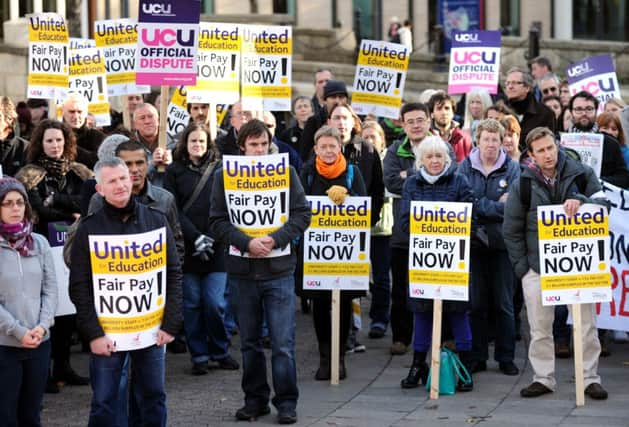Chris Marshall: Uni principals must show restraint


But the way our higher education institutions spend their money is a matter for us all, given the huge public subsidies they receive and the financial boon which has come their way as a result of £9,000-a-year tuition fees.
Earlier this week, the University and College Union (UCU) said its members would enforce a marking boycott, potentially putting students’ graduations at risk, should a deal not be reached with management.
Advertisement
Hide AdAdvertisement
Hide AdThis follows a series of strikes which lecturers have held in protest at a 1 per cent pay award.
Figures obtained by the UCU have shown that while lecturers are being asked to make do with a below-inflation rise, many universities have continued to award their principals raises which are not only out of touch with the Consumer Prices Index (CPI), but all semblance of reality.
According to the UCU figures, Professor Steve Chapman, the principal and vice chancellor of Heriot-Watt University in Edinburgh, received a 24.3 per cent rise in 2012-13, seeing his tidy £169,000 salary grow to a tasty £210,000, excluding pension contributions.
He is far from being alone, however. The UCU’s analysis shows that all but one of the university bosses where figures were available earned more than the prime minister’s salary of £142,500 in 2013.
For their part, universities argue their senior managers are akin to those at board level in large private companies and should be remunerated accordingly.
But universities are not private companies. Collectively, institutions receive around £1 billion annually from the Scottish Government. The coffers are further swollen by tuition fees from students outside of Scotland, with UK undergraduates now paying up to £9,000 a year to study at institutions such as Edinburgh and St Andrews.
It is against this background that education secretary Mike Russell urged principals to show “leadership” and “restraint”, describing their pay packages as “massively out of step” with those received by other university staff.
The minister is right. At a time when many students are forced to combine their studies with two or three jobs to get by, and when staff have seen their take-home pay fall in real terms, principals should show restraint.
Advertisement
Hide AdAdvertisement
Hide AdIndeed, some are already doing that. One of Scotland’s best paid principals, Sir Timothy O’Shea, vice chancellor of Edinburgh University, did not take a rise last year on his more than adequate £227,000. It is time others followed suit.